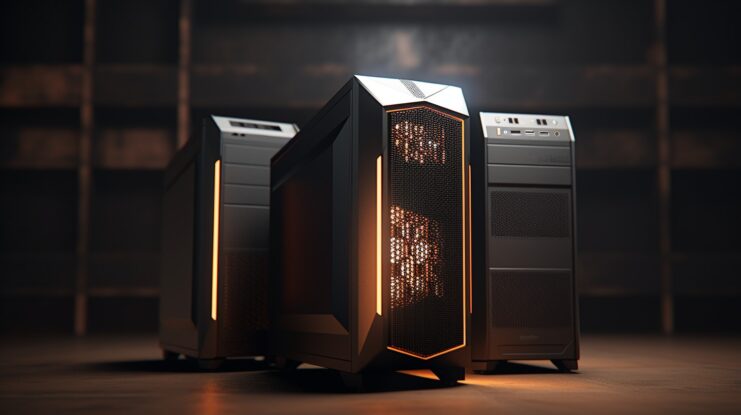When building a custom PC, selecting the right case size is crucial. With various sizes available, from full towers to small form factor cases, each offers distinct advantages and limitations. Among many things, I will discuss:
- The text emphasizes the crucial role of selecting the right PC case size for a custom build, highlighting that different sizes cater to various needs and preferences.
- It discusses how the choice of motherboard, whether ATX, micro-ATX, or mini-ITX, influences the selection of the PC case size.
- How case size impacts cooling strategies.
Today, I want to help you navigate through all these options, ensuring you choose the best case size for your specific needs, whether for gaming, professional work, or general use. Knowing these nuances of each case size will lead to a more informed and satisfying build.
Factors Influencing Case Size Selection
When choosing a PC case size, several key factors come into play, influencing your decision based on your specific requirements and future plans for your PC. This is the first thing that requires your attention before you are able to go through the options available at the market.
Motherboard Compatibility
Motherboard compatibility is a pivotal factor in determining the appropriate PC case size for your build. The motherboard serves as the central hub for all your PC components, and its size and form factor set the groundwork for the rest of your build. There are several common motherboard sizes, each with its own set of features and capabilities.
| Case Type | Compatible Motherboard Sizes | Ideal For |
|---|---|---|
| Full Tower | EATX, ATX, Micro-ATX | High-end gaming, workstations, servers |
| Mid Tower | ATX, Micro-ATX | General use, gaming, professional work |
| Mini Tower | Micro-ATX | Compact builds, small office/home spaces |
| Small Form Factor (SFF) | Mini-ITX | Ultra-compact builds, portability |
ATX Motherboards
These are the standard size for most PCs, offering a good balance of size and expansion slots. ATX motherboards typically include multiple PCIe slots for graphics cards and other add-ons, as well as ample RAM slots and connectivity options. They are ideal for users who want a versatile build capable of gaming, work, or general use.
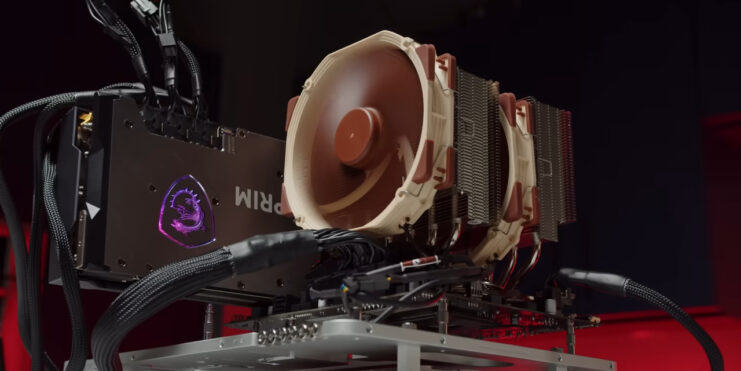
Micro-ATX Motherboards
Smaller than ATX, micro-ATX motherboards are a compact option that still offers a good number of expansion slots and features. They are well-suited for users who want a smaller PC without significantly compromising on functionality.
Mini-ITX Motherboards
These are the smallest mainstream motherboards, designed for very compact builds. While they offer fewer expansion slots and RAM slots, they are perfect for small form factor cases and builds where space-saving is a priority.
Cooling Requirements
Cooling is a critical aspect of any PC build, and the case size can significantly impact your cooling strategy. Larger cases like full towers provide ample room for multiple fans, large air coolers, or extensive custom water-cooling setups, essential for overclocking or high-performance builds.
Mid towers, while smaller, still offer decent options for effective cooling solutions. In contrast, mini towers and SFF cases require more thoughtful cooling approaches due to their limited space, often relying on low-profile coolers or compact AIO solutions.
| Case Type | Compatible Motherboard Sizes | Ideal For | Cooling Options |
|---|---|---|---|
| Full Tower | EATX, ATX, Micro-ATX | High-end gaming, workstations, servers |
|
| Mid Tower | ATX, Micro-ATX | General use, gaming, professional work |
|
| Mini Tower | Micro-ATX | Compact builds, small office/home spaces |
|
| Small Form Factor (SFF) | Mini-ITX | Ultra-compact builds, portability |
|
Expansion and Upgrade Potential
Your plans for future upgrades should also influence your case size choice. If you anticipate needing more space for additional hardware, larger cases offer the flexibility to accommodate extra drives, larger GPUs, or additional PCIe cards.
If you prefer a build that meets your current needs without much room for expansion, a mini tower or SFF case might be more appropriate.
Space and Portability
Physical space constraints and the need for portability are practical considerations. Full and mid tower cases require more desk or floor space and are less portable due to their size and weight. Mini towers and SFF cases are ideal for small spaces or if you need to frequently move your PC, such as for LAN parties or travel.
Different PC Case Sizes
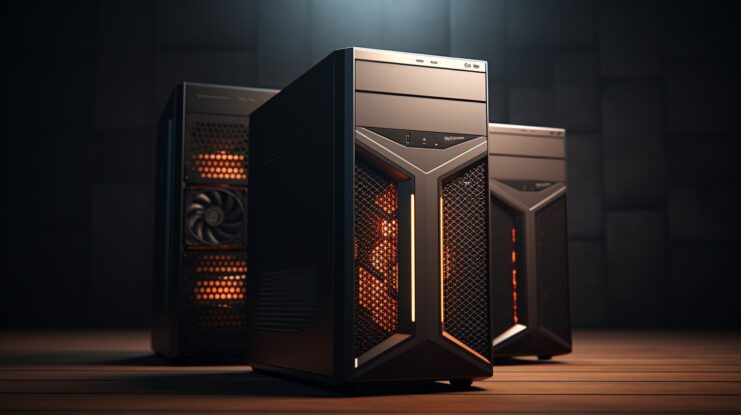
Naturally, you need to be aware of different PC case sizes before you are able to make a decision.
Full Tower
Full tower cases, typically measuring between 22 to 27 inches in height, are the giants in the world of PC cases. They are designed for enthusiasts who demand the best performance and cooling for their high-end components.
These cases can accommodate extended-ATX (EATX) motherboards, offering ample space for multiple graphics cards, extensive cooling systems, including custom water-cooling loops, and numerous storage drives.
The spacious interior of full tower cases allows for excellent airflow, which is vital for maintaining optimal temperatures during intense gaming sessions or heavy computational tasks. This space also provides ease of access and flexibility for installing and upgrading components.
Their size can be a drawback for those with limited space or who prefer a more minimalist setup.
Mid Tower
Mid tower cases, with heights ranging from 17 to 21 inches, strike a balance between size and functionality. They are compatible with ATX and micro-ATX motherboards, making them a versatile choice for most PC builders. These cases offer a good mix of expandability and compactness, suitable for both gaming and professional workstations.
While they may not support the same level of expansion as full towers, mid towers can still house powerful hardware, including multiple GPUs and adequate cooling solutions. They are easier to manage and fit in most desk setups, making them a popular choice among mainstream users.
Mini Tower
Mini tower cases, standing at about 14 to 16 inches, are designed for micro-ATX and mini-ITX motherboards. These cases are ideal for users who need a compact system without sacrificing too much on performance.
They can still house decently powerful hardware but have limitations in terms of cooling and expansion capabilities compared to larger cases. Mini towers are perfect for small office spaces, living rooms, or for users who prioritize a smaller footprint.
Building in a mini tower can be challenging due to the limited space, especially for first-time builders.
Small Form Factor (SFF)
SFF cases are the smallest, typically less than 14 inches in height, and are designed for mini-ITX motherboards. These cases are all about portability and space-saving. They are perfect for users who have very limited space or need a PC that can be easily transported.
Despite their size, SFF cases can be surprisingly powerful, supporting high-end CPUs and GPUs. However, they require careful planning and component selection, especially regarding cooling solutions and PSU size. Cable management can also be more challenging in these compact environments.
Case Features and Aesthetics
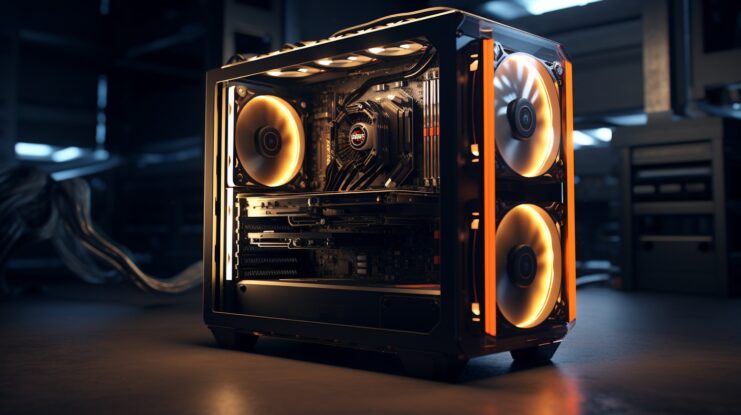
Beyond size, the features and aesthetics of a PC case play a significant role in the building experience and overall satisfaction with the end product. These aspects can affect not just the look of your PC build, but also its functionality and ease of use.
Airflow and Cooling Features
One of the most crucial features of a PC case is its airflow capability, which directly impacts the cooling efficiency and, consequently, the performance of your system. Good airflow is essential to keep components at optimal temperatures, especially for high-performance builds or overclocked systems.
Cases with well-designed air intake and exhaust, along with multiple fan mount points, offer better cooling. Larger cases typically provide more options for fan placements and bigger radiators, while smaller cases require more strategic planning to ensure adequate airflow.
Cable Management
A well-thought-out cable management system is vital for both aesthetics and airflow. Cases with cable routing cutouts, tie points, and enough space behind the motherboard tray make it easier to manage cables neatly.
This not only makes the build look cleaner but also improves air circulation inside the case. High-end cases often come with additional cable management aids like Velcro straps or cable covers.
Aesthetics and Personal Style
The visual appeal of a PC case is a matter of personal taste and can be a significant factor in your choice. Cases are available in various designs, from minimalist and sleek to bold and RGB-lit. Tempered glass side panels are popular for showcasing internal components and lighting.
The color and finish of the case, along with its overall design language, should align with your personal style and the environment where the PC will be placed.
Build Quality and Material
The build quality and materials used in a PC case affect both its durability and appearance. Cases made with high-quality materials like steel, aluminum, or tempered glass not only look and feel better but also provide better support and protection for your components.
Case Recommendations for Different Needs
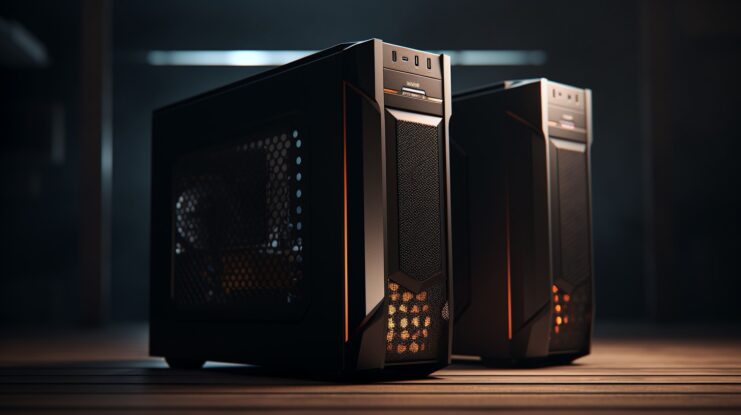
Choosing the right PC case depends on your specific needs, whether it’s for gaming, professional work, or general use. Here are some recommendations for each category, considering different case sizes.
For Gaming
When you are building a gaming configuration, you should look towards the following case solutions.
- Full Tower: For gamers seeking the ultimate performance with no compromises on cooling and expansion, the Thermaltake View 71 is an excellent choice. It offers ample space for high-end components, multiple GPUs, and advanced cooling systems, including room for large radiators and custom water-cooling loops.
- Mid Tower: The Fractal Design Define S2 strikes a balance between size and functionality, making it ideal for most gamers. It supports a wide range of motherboards, has good airflow, and offers enough space for effective cooling solutions and multiple GPUs.
- Mini Tower: The NZXT H210 is perfect for gamers who need a compact setup without sacrificing too much on performance. It supports mini-ITX motherboards and provides reasonable space for decent cooling and GPU options.
For Workstations
Workstations come with a completely different set of requirements you need to take into consideration.
- Full Tower: The Phanteks Enthoo 719 caters to professionals who require extensive storage and high-end components for tasks like video editing and 3D rendering. Its spacious interior allows for multiple storage drives and large-scale cooling solutions.
- Mid Tower: The Corsair 4000D Airflow is a versatile choice for professionals. It offers excellent airflow, a clean design, and enough room for most workstation-grade components.
- Mini Tower: For small office spaces, the Cooler Master Silencio S400 is a great option. It’s designed for quiet operation, which is crucial in a professional environment, and still provides enough space for a powerful, compact workstation.
For General Use
While finding the case for general use might be a little bit unclear, there are some average strivings you need to pay attention to.
- Mid Tower: The NZXT H510 is a popular choice for general use, offering a sleek design, ease of building, and adequate space for standard PC components.
- Small Form Factor: The Thermaltake Core V1 is ideal for users with limited space. It’s compact yet versatile, offering good airflow and enough room for a basic yet powerful setup. In the conclusion, we’ll wrap up the key points and provide final thoughts on selecting the best PC case size for your next build.
FAQs
Do smaller PC cases get hotter?
Yes, smaller PC cases can get hotter due to limited space for airflow and fewer options for large cooling systems. Efficient cooling design and component selection are crucial in these cases.
Are mini ITX builds worth it?
Yes, mini ITX builds are worth it for users needing a compact, space-efficient system. They are ideal for small desks, living areas, or for those who prioritize portability.
Do fans matter in a PC case?
Absolutely, fans are essential in a PC case as they facilitate airflow, helping to keep components cool and prevent overheating, which is vital for system performance and longevity.
Is 2 PC case fans enough?
Two fans can be enough for a basic or moderately used PC, typically configured with one intake and one exhaust for balanced airflow. However, high-performance or gaming PCs might require additional fans for optimal cooling.
Summary
Choosing the right PC case size is a critical decision in the PC building process, impacting not just the aesthetics but also the performance, cooling efficiency, and future upgradeability of your system.
Remember to consider factors like motherboard compatibility, cooling requirements, and personal style.
With the right case, your next PC build can be both a powerful and visually pleasing addition to your workspace or gaming setup.

